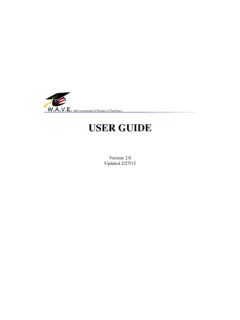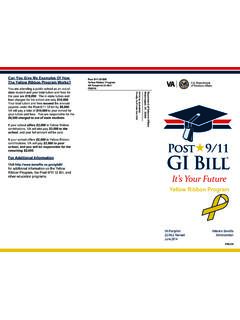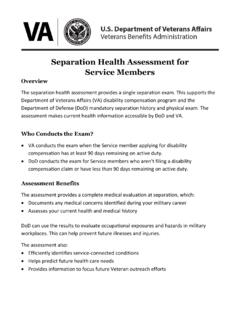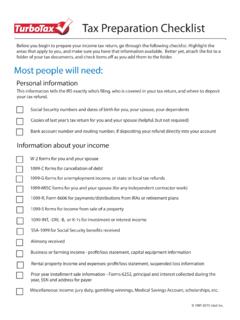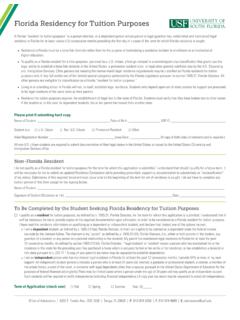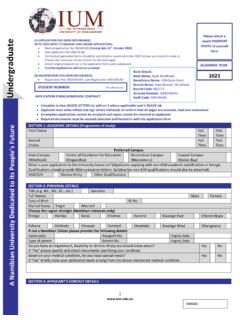Transcription of FIFTH EDITION | EDUCATION SERVICE - Veterans Affairs
1 Veterans BENEFITS ADMINISTRATION |OCTOBER 2016 GI BILL IS A REGISTERED TRADEMARK OF THE UNITED STATES DEPARTMENT OF Veterans Affairs (VA). THE ABSENCE OF THE REGISTRATION SYMBOL DOES NOT CONSTITUTE A WAIVER OF VA S TRADEMARK RIGHTS IN THAT to Consider When Choosing a school A guide before using the GI Bill FIFTH EDITION | EDUCATION SERVICE II | PAGET able of Contents Choosing a school that is Right for You .. 1 Can I Really Do This? .. 1 What are your interests? How do you want to make a living? .. 2 Types of Degrees .. 2 Types of Schools.
2 3 Feeder Schools .. 4 More than a degree: Benefits of having a college EDUCATION .. 5 You ve considered a career and major, now which school is best for you? .. 5 Would my intended professional field accept and respect a degree from the university or college I m considering? .. 6 Job Placement Promises v. Reality .. 7 How well does the school support Veterans ? Does it have a dedicated program? .. 7 Financing Your EDUCATION .. 8 So what if the best t a school ? .. 9 Make it count and good luck! .. 10 Resources .. 11 1 | PAGEC hoosing a school that is Right for You As an eligible Servicemember, Veteran, dependent, Guard member or Reservist planning to use the GI Bill, you are a consumer about to make one of the most important decisions of your life.
3 Where you begin your post-secondary EDUCATION is critical. Making informed decisions about how to make the most of your benefits and how a school can best meet your needs means doing a little homework before classes start. This guide presents eight important factors you should consider towards becoming an informed consumer first and a GI Bill user second. Can I Really Do This? Going back to school after the military can be a challenge. Break down some of your nagging questions about the future with some answers! While many students may be younger than you, there are bound to be other Veteransor already in the workforce returning to school .
4 Younger definitely doesn t make yousmarter and you have a wealth of life experience to draw on to get you through. You llfind it will serve you well in class. It s likely you have many things competing for yourattention - work, family, home, health, and financial issues. A few suggestions help youthrough: Pace yourself. It s ok to start off with a course or two to get the feel of beingin school . Feeling overwhelmed will make it tougher to focus, so ease into it if you can pick up the pace later. If your school has a Veterans Center (you can check thathere), take advantage of those resources.
5 Centers vary, but they can offer a dedicatedplace to study, assistance with benefits, and the support network you may be missingfrom your time on active duty. If your school doesn t have one, you can help start Veterans of America has chapters nationwide and can help out. Find a suitableplace to study. If noise or other people distract you, choose the library over a coffeeshop or home as a study spot Find or start a study with other help you stay focused andmotivated. Take breaks. At least once per hour stand up, move around, get something to drink orget a few minutes of fresh air If you have a health issue that may be affecting your learning, colleges and universitiesmay have accommodations to help you learn.
6 If the issue is SERVICE related, take2 | PAGE advantage of the VA s Vet Centers and Vocational Rehabilitation services. They are there to help! Keep in mind skills that made you a good Servicemember will make you a good student. Being able to stick to a schedule, listening, problem-solving, maintaining discipline, being responsible and keeping commitments gives you a leg up on the fresh from high school bunch. It s likely you have more responsibility than they do, but you have experience on your side, so feel free to wield it! What are your interests?
7 How do you want to make a living? You ll need to find a school that paves the path towards a career, so take some time to think about what you want your EDUCATION to do for you. Explore your vocational interests in-depth; the self-assessment tool CareerScope on the GI Bill website is designed to help you determine your vocational aptitudes as well as academic readiness. CareerScope is free to you and self-administered. It will provide an assessment of your interests and aptitudes, give recommendations about which careers you may enjoy, and help you decide which courses or training programs you should focus on to pursue those careers.
8 The Department of Labor s (DOL) career search tool My Next Move for Vets is the nation's primary source of occupational information. You can review information about careers for hundreds of standardized and industry-specific descriptors; Retail, Government, Health and Counseling, and Self-Employed are a few examples. DOL updates the tool by surveying a broad range of workers from each occupation. There is also a search engine to find careers similar to your military job and it has assessment instruments for workers and students who want to find or change careers.
9 You might also want to research the projected demand for career fields. The Bureau of Labor Statistics Occupational Outlook Handbook provides information on the expected job prospects for different types of jobs, the EDUCATION needed, earnings, what workers do on the job, and working conditions. Types of Degrees There are different types of post-secondary degrees you can obtain when you choose to pursue higher EDUCATION . These include Associate s, Bachelor s, Master s, and Doctoral degrees. 3 | PAGEAn Associate s degree program is typically two years, and is usually completed at a community college; some four-year universities also offer Associate s degree programs.
10 Traditional degrees offered are Associate s of Arts ( ) or Associate s of Science ( ). If a student is enrolled in an Associate s program in fine arts, he or she will earn an Associate s of Fine Arts degree after completing the program. An Associate s degree generally requires 60 credit hours of training and takes two years of full-time attendance to earn. A student with an Associate s can seek employment afterwards or can transfer into a four-year program at a college or university and work towards earning a Bachelor s degree. A Bachelor s degree program is obtained at a college or university, with degree programs that usually last four years; the two primary degrees are Bachelor s of Arts ( ) or a Bachelor s of Science ( ).


